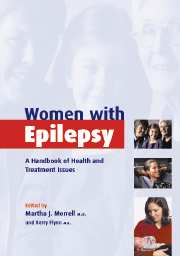Book contents
- Frontmatter
- Contents
- List of contributors
- Part I The woman with epilepsy
- Part II Epilepsy diagnosis and treatment
- Part III Hormones and the brain
- Part IV Health challenges for women with epilepsy
- Part V Family planning, pregnancy, and parenting
- Part VI Living well with epilepsy
- 23 The impact of epilepsy on relationships
- 24 Parenting the daughter with epilepsy
- 25 Safety issues for women with epilepsy
- 26 Legal issues facing women with epilepsy
- 27 Work issues and epilepsy
- Appendix: The Epilepsy Foundation's Campaign for Women's Health: bringing help and hope to women with epilepsy
- Index
- References
26 - Legal issues facing women with epilepsy
from Part VI - Living well with epilepsy
Published online by Cambridge University Press: 02 November 2009
- Frontmatter
- Contents
- List of contributors
- Part I The woman with epilepsy
- Part II Epilepsy diagnosis and treatment
- Part III Hormones and the brain
- Part IV Health challenges for women with epilepsy
- Part V Family planning, pregnancy, and parenting
- Part VI Living well with epilepsy
- 23 The impact of epilepsy on relationships
- 24 Parenting the daughter with epilepsy
- 25 Safety issues for women with epilepsy
- 26 Legal issues facing women with epilepsy
- 27 Work issues and epilepsy
- Appendix: The Epilepsy Foundation's Campaign for Women's Health: bringing help and hope to women with epilepsy
- Index
- References
Summary
Jeanne Carpenter is a partner in a Washington-based law firm. She is past President and Chair of the Epilepsy Foundation and is currently on the National Board of Directors. She is an eloquent spokesperson on behalf of people with epilepsy and has been a strong supporter of the Epilepsy Foundation's Women with Epilepsy Initiative. As a woman with epilepsy, Ms Carpenter has experienced many of the challenges discussed in this book. In this chapter she addresses the legal issues of importance to women with epilepsy. These include employment, motor vehicle licensing, family law, and insurance.
MJMIntroduction
I was diagnosed with epilepsy when I was in my mid-twenties. After I heard my physician's view about the possible physical restrictions I would confront because of my seizures and the possible side effects of the medications, my immediate questions turned to how others might limit me and my daily activities. Could I still drive? Would my epilepsy impact my new job as an attorney? Did I have to disclose my epilepsy when making various types of applications? Would my medical insurance cover my doctor and hospital bills? These are common questions among women diagnosed with epilepsy and many raise possible legal issues that are not unique to women.
This chapter summarizes many of the areas in which legal issues arise; it is not intended to provide legal advice, nor can all legal issues that may result from epilepsy be answered, but it attempts to outline major issues for the most common concerns among those of us with epilepsy.
Keywords
- Type
- Chapter
- Information
- Women with EpilepsyA Handbook of Health and Treatment Issues, pp. 269 - 280Publisher: Cambridge University PressPrint publication year: 2003

